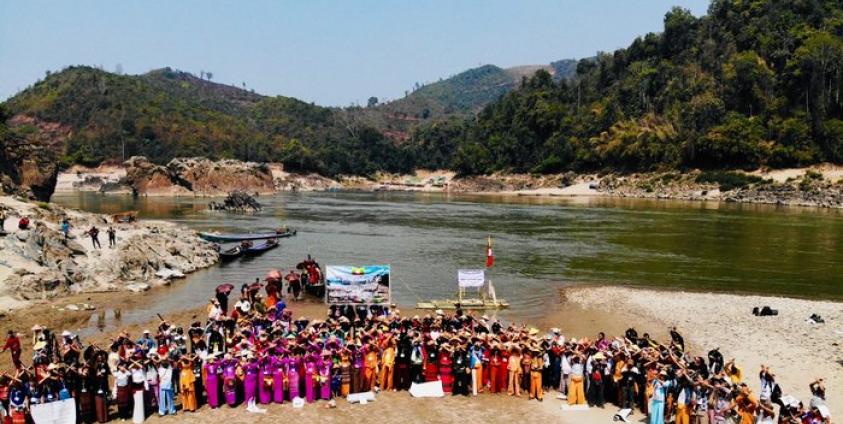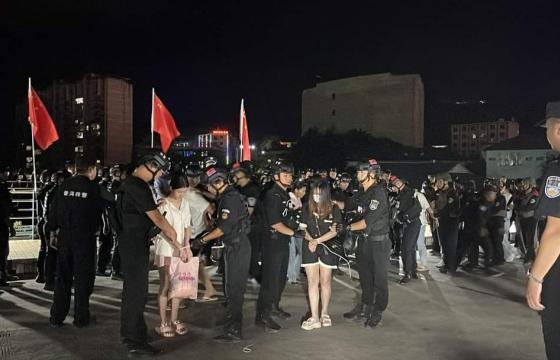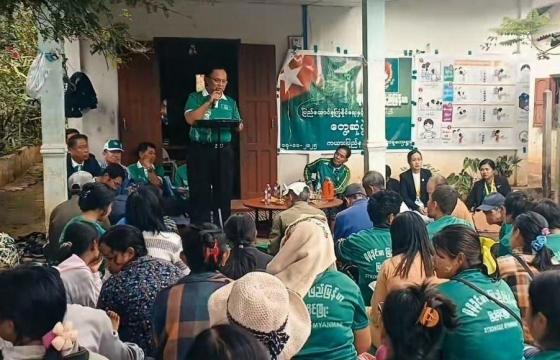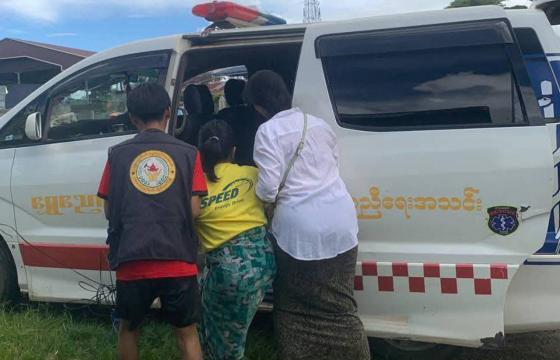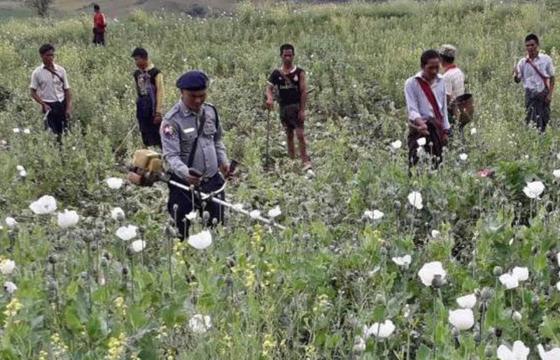Sai Wansai — On March 14, International Day of Action for Rivers, 23 countries’ indigenous, together with thousands of river stewards, defenders, and allies called for the protection of their rivers and rights to manage them, with hundreds more joined in via social media and digital outreach.
“We cannot express our gratitude for these river defenders and stewards enough. In this time of collective uncertainty, they remind us of exactly what is needed – a vision for a healthy future. One in which human and natural life are joined by principles of reciprocity and respect. Where our water sources are protected as our lifeblood. And where the voices of indigenous, and local communities, women, and other marginalized groups are at the forefront. The outpouring of solidarity with #RiversUniteUs (hashtag) during this time is testament to the commitment of so many communities and individuals around the world protecting our vital freshwater,” wrote the International Rivers in its report on March 17.
“Groups indigenous to the Salween River basin in Myanmar joined together in solidarity for a protected and free-flowing Salween River. The Salween is the last free-flowing river in Asia and currently threatened by numerous plans to build dams on the mainstream and its tributaries, which would displace local peoples and destroy their livelihoods and cultures. This March 14, thousands of ethnic people including ethnic Kachin, Chin, Shan, Ta’ang, Pa-O, Karenni, Arakan, Karen, and Mon gathered on the bank of the Salween River in Karen State. For many groups it was the first time they attended such an inter-ethnic gathering calling for the free-flowing Salween River,” the report wrote.
A nearly nine minutes short video podcast of Karen Environmental and Social Action Network (KESAN) and Karen Human Rights Group (KHRG) uploaded quite recently showed that on the International Day of Action for Rivers approximately 1,700 villagers from Hpa-an and Hpapun or Mutraw districts came together, including other ethnic nationalities, at Hatgyi proposed dam site to protest against the dam projects on Salween River in Karen and other ethnic states.
The report said that altogether five proposed dam projects on the Salween River are still on the table, which have not been scrapped yet, upon which all the ethnic nationalities are protesting to be permanently shelved, as evident by the airing of all participant representatives at the gathering.
On the occasion, impressive formation of “NO DAM” slogan using hundreds of human participants was assembled on the bank of the Salween, which was recorded using drone video filming. All representatives from ethnic Kachin, Shan, Ta’ang, Karenni, Karen and Mon etc. uniformly expressed their attitude of no dam building on all major rivers of Burma or Myanmar. There was also a scene of a Karen elder, accompanied by another, praying to divine beings at bamboo-build alter on the bank to save the Salween from devastation, which seems like a desperate move on the face of dam promoters’ political clout, compounded with no reaction from the government.

“Not only the dams in Kawthoolei (Karen State) shouldn’t be built, we also don’t want any dam in Burma,” said a Karen demonstrator.
The infrastructure construction in indigenous territories must only be done with the permission of the indigenous people, wrote the KHRG on the occasion in its recent posting.
Myitnge or Namtu River
This gathering on March 14 was in Karen State along the Salween River in the south of Myanmar. But elsewhere in the north in northern Shan State another such gathering on the same day also took place.
To mark the International Day of Action for Rivers, villagers from Talong and nearby townships held a blessing ceremony, calling for a stop to all dams and mining along the Namtu or Myitnge River, a major tributary of Ayeyarwady River (Irrawaddy), in Hsipaw, northern Shan State.
The name Myitnge in Burmese and Dokhtawaddy in Pali both mean “little river”, by contrast with the Ayeyarwady or “big river”.
“Today about 500 villagers,including monks, farmers and youth from various townships gathered at the Namtu River bank at Talong to pray for the health and longevity of the river, and for a halt to four planned large hydropower dams and to the restarting of the giant Bawdwin-Namtu lead-silver mine by an Australian-led consortium near the source of the river,” said the statement released by Ta Long villagers on the occasion of International Day of Action for Rivers.
According to the statement, the most advanced dam project, the Upper Yeywa –being built by Chinese, Japanese, Swiss and French companies –will flood the entire village of Talong, housing nearly 700 inhabitants, as well as ancient historical sites and fertile agricultural land which villagers have relied on for generations.
Construction has also started at the site of another planned project, the 210 megawatt Namtu/Hsipaw dam, about 25 kilometers north of Hsipaw town, despite the fact that no Environmental Impact Assessment has been carried out, and there has been no formal approval of the project. The project holder is Natural Current Energy Hydropower Co. Ltd. (NCEH).
The statement pointed out the angst of negative effects that could befall on the population as: “The Namtu-Hsipaw dam will submerge the village of Lilu, with 212 residents. Downstream Hsipaw residents fear disrupted water flows, and flooding from sudden dam releases. They also fear lead pollution in the dam reservoir, from the Bawdwin-Namtu mines about 40 kilometers upstream–which will have particularly damaging impacts on children. Australia-based Myanmar Metals, with 51% shares in the Bawdwin mine, plans to process two million tonnes of lead ore a year, making it the third largest producing lead mine in the world.”

Salween River
In the same vein, on the same day to mark the International Day of Action for Rivers hundreds of local villagers in Kunhing Township, southern Shan State, held a blessing ceremony on the banks of the Salween River so that it may flow freely forever, including making merit at the well-known Ho Leung stupa, built 700 years ago, to pray for the river’s longevity.
About 400 local villagers from Ho Pang village tract, Phang Lang village tract, Keng Lom village tract, Wan Tong village tract, Hsai Mong village tract, Weing Phui village tract, Wan Pang village tract, Wan Lao village tract, and Wan Phai village tract, including youth, farmers and monks gathered on March 14 at Ta Ho Kaw, north of the Ta Kaw bridge, with banners to protect the environment and rivers, and floated a raft bearing that message.

shanhumanrights.org
According to the press release of the Kunhing villagers, “Large areas of Kunhing township will be submerged by the reservoir of the planned Mong Ton dam on the Salween River, including the numerous islands in the Pang river tributary, which give Kunhing (meaning “Thousand Islands” in Shan) its name. The historic Ho Leung stupa in Mong Paeng township will also go underwater.”
BRN Statement
Concerning the gathering of International Day of Action for Rivers Burma Rivers Network (BRN), together with its 11 members, Karenni Civil Society Network, Kayan New Generation Youth, Future Thanlwin, Shan Sapawa Environmental Organization, Arakan Rivers Network, Ta’ang Student and Youth Union, Kuki Women Human Rights Organization, Kachin Development Networking Group, Pawnglong community, Karen Rivers Watch, Mon Youth Progressive Organization, Chin Rivers Network; and Mungchying Rawt Jat – MRJ, issued a statement.
The BRN, together with ethnic communities around the country, called for an immediate halt to plans by the Burmese government and the multinational hydropower industrial complex to build cascades of dams on major rivers and tributaries in Burma’s ethnic conflict zones.
While BRN welcomes the February 2018 International Financial Cooperation’s (IFC) recommendations of against mainstream dams in all major rivers in Burma, in its statement BRN strongly opposes IFC’s attempts to downplay the critical importance of tributaries in preserving the ecological health of river basins and in sustaining the livelihoods of countless ethnic communities.
BRN also condemns IFC’s failure to acknowledge that promotion of central government dams against the wishes of local ethnic communities is fueling the conflict, and directly undermining the current peace process.
“Currently, Burma’s Energy Master Plan includes over 50 planned dams, mainly on the Salween and Irrawaddy rivers and their tributaries. The construction of these dams will result in a huge increase in hydropower production from 3,000 to 46,000 megawatts by 2030, three quarters of which will be exported to China, Thailand and other foreign countries,” the statement pointed out the export oriented plan of the government.
What Now?
As could be seen the awareness level of the ethnic and indigenous people regarding dam building and management of the rivers are now becoming very profound, thanks to the mobilization and awareness-building of the local non-governmental organizations in cooperation with the international non-government organizations on environmental preservation cognizance.
Moreover, it is becoming apparent such dam building undertakings will wipe out their livelihood and way of sustenance. Even more important is the point that the electricity which would be produce at the expense of the ethnic people in damming areas wouldn’t even benefit them, as all will be exported, apart from only fueling the existing conflict and derailing the fragile peace process that has been stagnated for more than a year now.
Thus, the call for no dam from the point of ethnic nationalities is a legitimate concern that has to be given a serious thought by all concerned stakeholders.
<><><>
Caption : shanhumanrights.org


